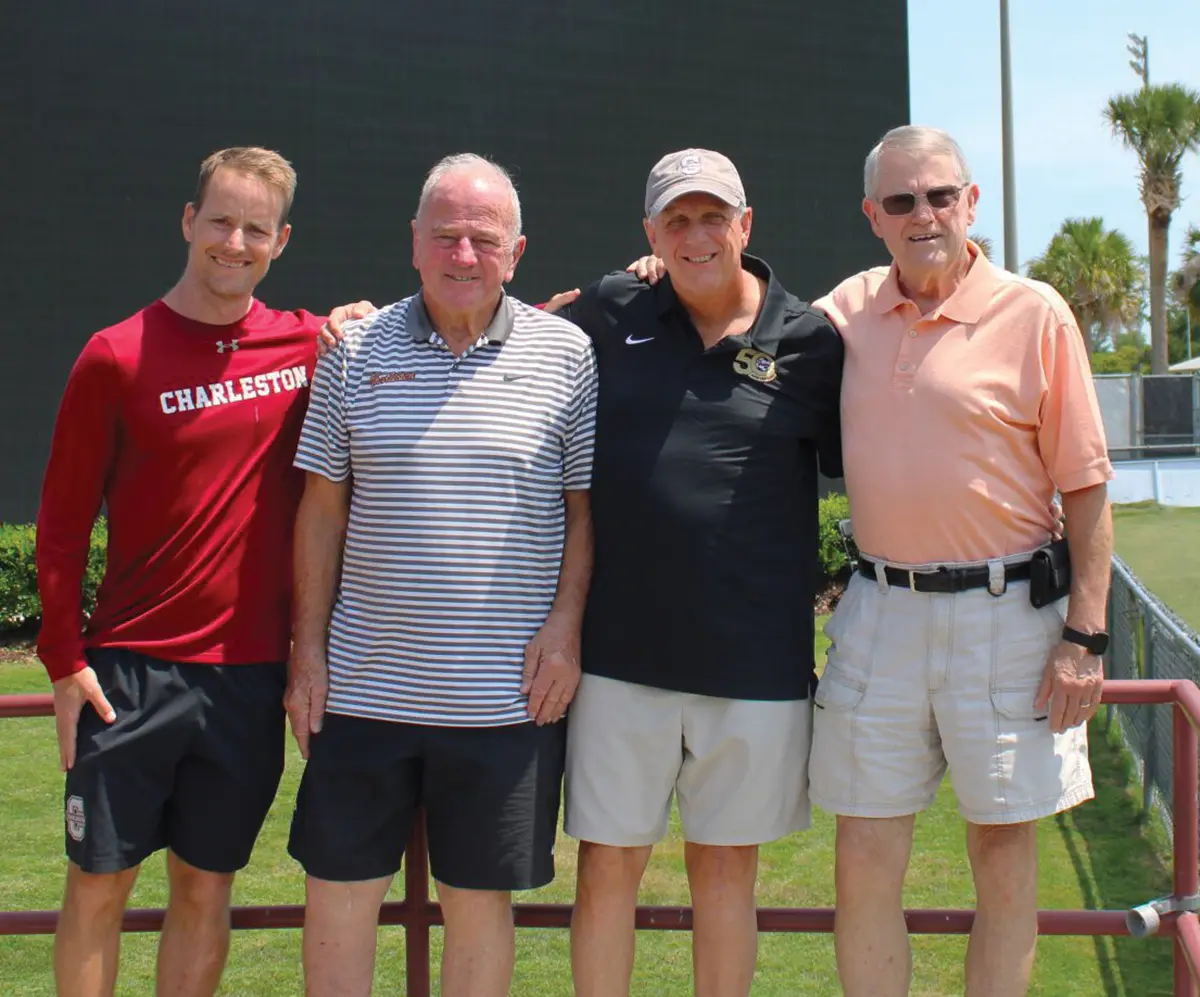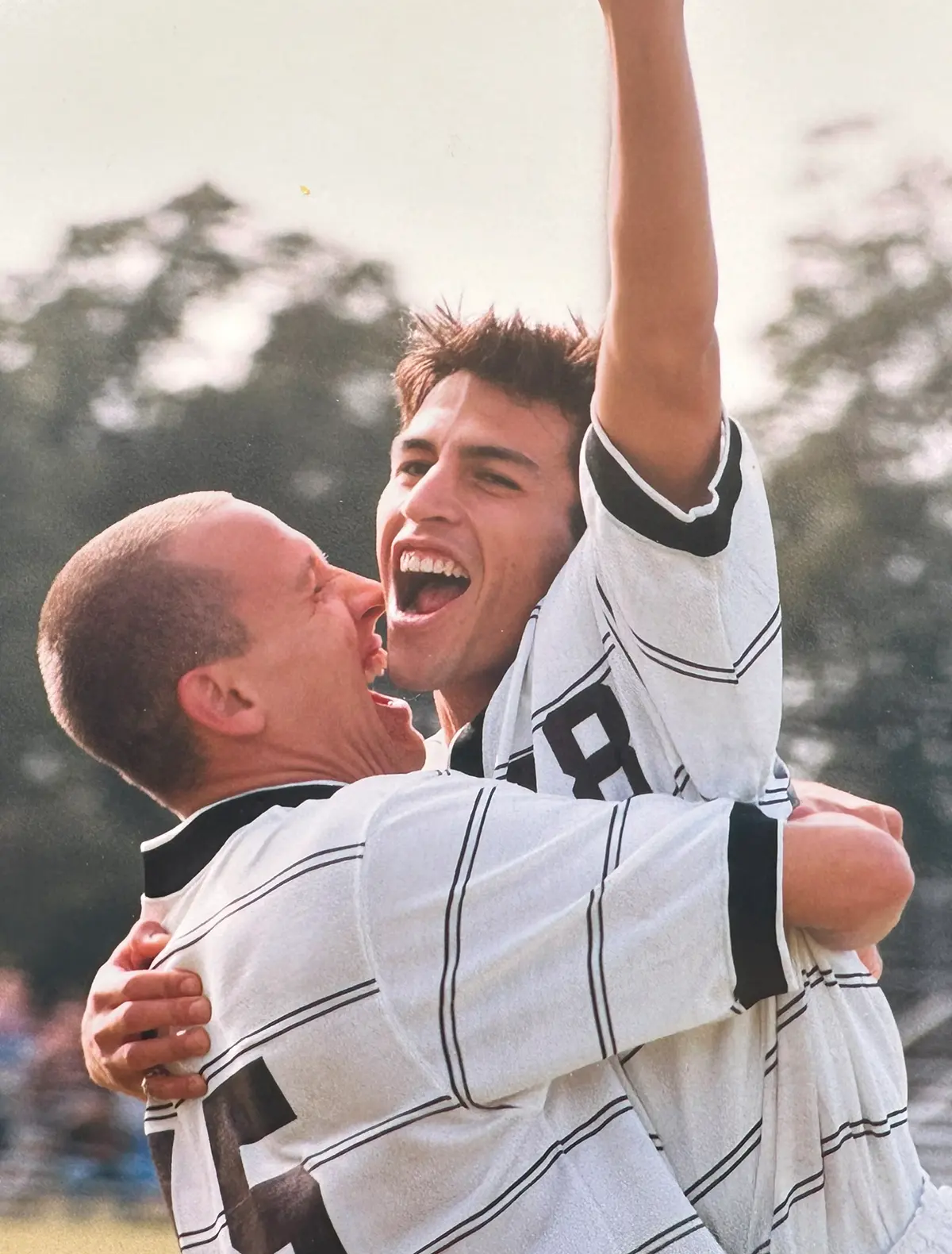
NET GAINS
WHEN TED MILLER THINKS BACK ON THE early days of the men’s soccer program, the memories flood back to him like a first-time father recalling those sleepless nights with a colicky newborn.
Sure, there were long days, followed by even longer nights, and there were some messes to clean up and hurdles to clear, but it’s an experience that Miller wouldn’t trade for anything.
“I have so many great memories from my time at the College of Charleston,” says Miller, who coached the team from 1974 to ’78. “The friendships and relationships that I made with the players and coaches are still alive today. It was an incredible experience.”
The soccer program, which celebrated its 50th season in the fall, has grown from its humble beginnings where finding a place to practice shifted depending on the day of the week to its current status as a Division I program with one of the top facilities in the Coastal Athletic Association.
“To watch the program evolve from afar into what it has become has been amazing,” says Miller.
With little in the way of financial support, Miller and his players had to scramble not only to find places to train, but to play matches.

There were even issues acquiring basic equipment like soccer goals, which Miller routinely had to borrow from The Citadel.
In 1979, one of Miller’s first recruits – Colin Smoak ’78 – took over the program. By this time the Cougars were playing their home games at Porter-Gaud School, which was a significant upgrade. Roby Stahl took the helm four years later.
But Smoak and Stahl were merely caretakers of the program as a transformative coach, who would lead the Cougars from NAIA to Division I, loomed on the horizon: Ralph Lundy. Lundy had built an NAIA powerhouse at Erskine College and wasn’t looking for another job. But the lure of the school moving to the Division I level and his wife’s love of the Lowcountry were too much to overlook.
Lundy took over in 1987 and for the next three decades worked tirelessly to put the Cougars on the national soccer map.
“I don’t think you can overemphasize coach Lundy’s impact on the program,” says current men’s soccer coach Keith Wiggans ’04, who played for Lundy from 2000 to ’04.
Lundy would roam the sidelines for more than three decades, leading the Cougars to previously unmatched heights, which included 323 wins, 19 winning seasons, five conference championships and five NCAA tournament appearances.
“I didn’t score a goal, didn’t make a tackle or a save,” says Lundy. “It was the players that made me a good coach.”
The team had shifted its home matches from downtown Charleston to Remley’s Point in Mt. Pleasant, where mole crickets and bugs became a 12th man for the Cougars.
“Remley’s was a great place to play,” says Chris Terry ’97, who helped lead the Cougars to an NCAA Tournament bid in 1994. “Those huge container ships would sail by during games. It was an incredible venue.”
In 1988, Lundy put the program on the national stage when Notre Dame came to the Lowcountry for a visit. The match drew more than 3,000 fans, and the Cougars came away with a 3-2 victory.
“That match changed everything,” says Lundy. “We were on the verge of going Division I, and that match proved we belonged at that level.”
Two of Lundy’s most memorable squads came in 1994 and 2004. Both were conference champions and NCAA Tournament teams.
The 1994 squad went 19-7 and advanced to the Elite Eight of the NCAA Tournament – falling to UCLA 3-2.
“It’s been 30 years, but it still breaks my heart to think about the loss to UCLA,” says Terry.
A decade later, with Wiggans in net and Troy Lesesne ’04 (M.A. ’10) patrolling the midfield, the Cougars beat South Carolina in the NCAA Tournament before falling to the University of North Carolina at Greensboro.
“Those two teams were special and had a lot of similarities,” says Lundy. “The players loved to play the game, and they were as competitive as any group I’ve ever been around.”
In 2000, the Cougars moved into their current home at Patriots Point. Lundy hung up his whistle in 2019, passing the program on to Wiggans, who had been an assistant coach with the Cougars for a dozen years.
“The program couldn’t be in better hands,” says Lundy.
The bond between players that helped build the program to current team members is stronger than ever.
“Coach Lundy was instrumental in bringing those generations together,” says Lesesne, who is the head coach for Major League Soccer’s D.C. United. “He’s helped foster those relationships. They have a common bond, a common thread, and that’s unique and very rare at the collegiate level.”